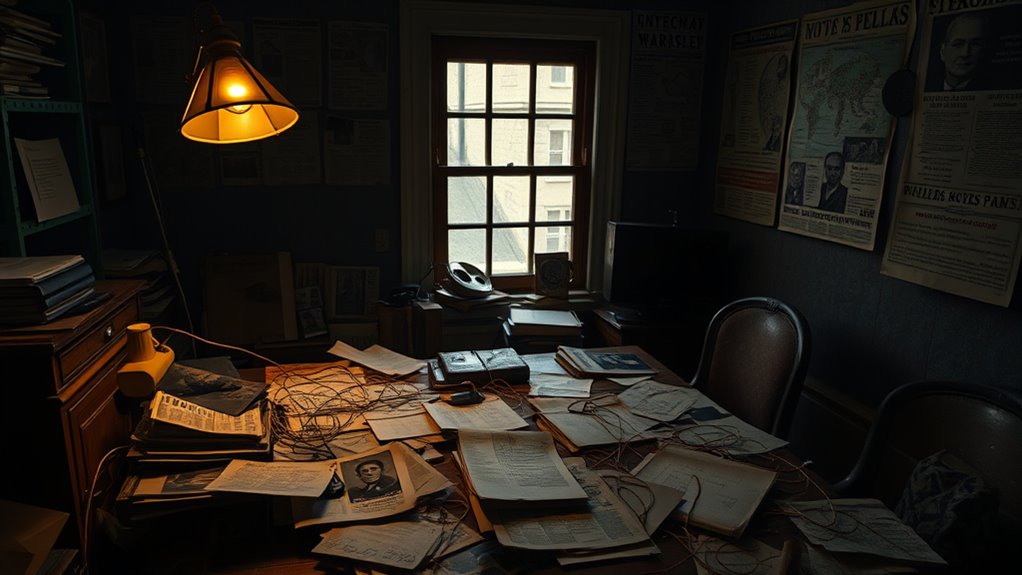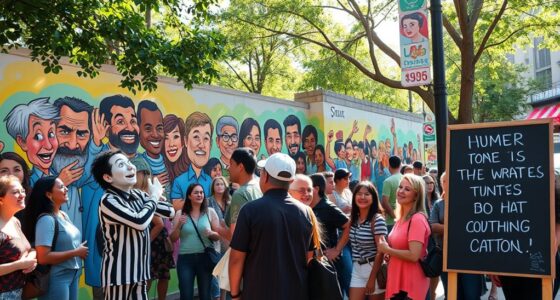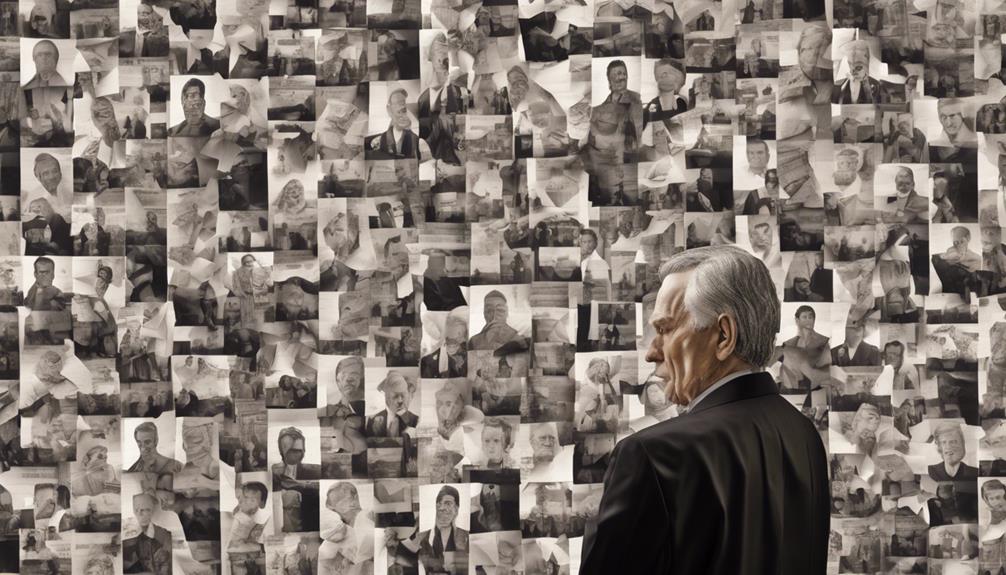Throughout history, political conspiracy theories have flourished amid government secrecy and media influence. When authorities hide information or restrict access, suspicions grow, and rumors take hold. Media outlets and, more recently, social media amplify these fears by spreading unverified claims and sensational stories. This cycle of secrecy and information dissemination keeps conspiracy theories alive and evolving. If you stay curious, you’ll uncover more about how these patterns have shaped public perception over time.
Key Takeaways
- Political conspiracy theories have existed throughout history, often fueled by government secrecy and media manipulation.
- Cold War era secrecy and misinformation contributed to widespread beliefs in hidden alien activities and covert operations.
- The advent of mass media and later social media expanded the reach and influence of political conspiracy theories.
- Official secrecy and limited information create a vacuum, which conspiracy theories fill with suspicion and rumors.
- The interplay between media influence and government secrecy has historically sustained and amplified political conspiracy beliefs.

Political conspiracy theories have long shaped public perception and influenced historical events, often thriving in times of uncertainty and upheaval. You might notice how media influence plays a vital role in fueling these theories. When news outlets or social media platforms spread rumors or unverified claims, they create fertile ground for suspicion. Media outlets can sometimes sensationalize stories, intentionally or not, amplifying fears and doubts about government actions. This influence helps conspiracy theories gain traction, especially when official channels remain silent or are perceived as untrustworthy. Government secrecy further fuels these theories, as the public often suspects that authorities hide essential information for their own benefit. When governments classify documents, restrict access to certain records, or withhold details about covert operations, it leaves space for speculation. You might find yourself questioning what’s being hidden and why. Secrecy becomes a double-edged sword — it protects national interests but also feeds the narrative that there’s a hidden agenda at play. Throughout history, this cycle has persisted. For example, during the Cold War, secrecy and media manipulation led to widespread beliefs that governments were hiding aliens, secret laboratories, or underground bunkers. These stories gained momentum because official information was scarce, creating a vacuum that conspiracy theories eagerly filled. As media evolved, so did the reach of these theories. Today, social media allows you to access an endless stream of information—some credible, some not. This democratization of information means you’re more likely to encounter conspiracy theories that challenge official narratives. Sometimes, they’re based on genuine concerns about government overreach or corruption, but often, they’re driven by misinformation or deliberate disinformation campaigns. Whether you’re reading about secret societies, shadow governments, or clandestine plots, it’s important to remember that media influence and government secrecy are intertwined. These factors don’t just shape conspiracy theories—they help sustain them. They create a cycle where secrecy invites suspicion, and media coverage amplifies that suspicion, whether intentionally or not. Understanding how media influence works is crucial to critically evaluating the information you encounter. Your role as a consumer of information is essential; questioning sources and seeking verified facts can help you distinguish between plausible concerns and unfounded theories. Recognize that the history of political conspiracy theories is rooted in these dynamics, and understanding their origins can help you navigate the complex web of truth and fiction that continues to influence political discourse today.
Frequently Asked Questions
How Do Conspiracy Theories Influence Modern Political Campaigns?
Conspiracy theories influence modern political campaigns by shaping public perception through media manipulation, often spreading misinformation quickly. You might see grassroots activism fueled by these theories, which can mobilize voters or create distrust in opponents. This dynamic impacts campaigns profoundly, as candidates must address false narratives or leverage these theories to sway opinions, highlighting the power of misinformation and grassroots efforts in shaping political outcomes today.
What Role Do Social Media Platforms Play in Spreading Conspiracy Theories?
Social media platforms play a huge role in the viral spread of conspiracy theories by allowing false information to reach millions quickly. You often find yourself in echo chambers where like-minded people reinforce these theories, making them seem more credible. This environment makes it easier for conspiracy theories to take hold, shaping opinions and fueling distrust in institutions. The rapid spread and reinforcement make it difficult to counteract false narratives effectively.
Are There Psychological Factors That Make People Believe Conspiracy Theories?
You’re irresistibly drawn to conspiracy theories because psychological biases and cognitive distortions distort your perception of reality. These mental shortcuts make you see patterns where none exist and fuel your need for certainty in chaos. It’s as if your mind is wired to believe the unbelievable, magnifying fears and suspicions. This powerful psychological pull can override logic, making you believe even the most outlandish theories with unwavering conviction.
How Have Governments Historically Responded to Political Conspiracy Theories?
Governments have often responded to political conspiracy theories through a mix of censorship and intelligence operations. They might suppress information that fuels these theories, using government censorship to control the narrative. At the same time, intelligence agencies conduct operations to monitor, discredit, or expose conspiracy claims, aiming to protect national security and public trust. Your understanding of these tactics reveals how authorities manage perceived threats to stability.
What Impact Do Conspiracy Theories Have on Public Trust in Institutions?
Imagine a door opening to reveal a tangled web of media manipulation that shakes your confidence. Conspiracy theories cause trust erosion in institutions, making you doubt official stories and authority figures. As misinformation spreads, you might feel more suspicious and less willing to believe in government transparency. This cycle deepens mistrust, affecting how you interpret news, politics, and societal changes, ultimately weakening the foundation of public trust in essential institutions.
Conclusion
As you step back and imagine the shadowy figures lurking behind curtains of power, remember that conspiracy theories are like flickering candle flames—bright, intriguing, but often elusive. They dance in the darkness of uncertainty, casting long, twisting shadows across history’s wall. While some truths may eventually emerge from the darkness, many remain hidden, whispering secrets in the night. Stay curious, but always question what’s cloaked in the shadows, waiting to be uncovered.









